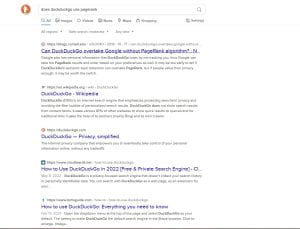How does DuckDuckGo’s privacy features affect search engine algorithms like PageRank?
Google is the most popular search engine, capturing “over 80% of the market share.” In class, we learned about PageRank, an algorithm that plays a part in sorting results from a search query. DuckDuckGo is a search engine that advertises itself as a secure and private platform that stops users from being contained in a filter bubble. This mission raises some questions about how DuckDuckGo’s results are affected by not using personalized results. Are results as reliable as other search engines that can use your data? Why should users care to protect their data? How does DuckDuckGo’s privacy implementations affect algorithms like PageRank?
DuckDuckGo’s main pull is protecting users from tracking and being kept in an echo chamber. Search leakage is cited as one big threat of using other search engines, where visiting pages can cause your information to be sent to these sites – this results in potentially being identified via user agent and IP address. Google’s search algorithm is not entirely dependent on the PageRank algorithm, but also uses search histories and data to personalize results and ads to users. DuckDuckGo claims to give you “truly private results without tradeoffs in results quality.” I wanted to test this claim out with several search queries that I knew would yield different results from what Google knew about me. For this test, I looked at one search result based on some searching I was doing while writing this blog post.
Looking up the exact query “does duckduckgo use pagerank?” resulted in a Cornell blog post coming up from 4 years ago. I thought this was an interesting finding because I originally thought that this blog was recommended to me on Google because of personalized data. What I didn’t expect was Reddit and Quora being ranked higher on the search results for Google than DuckDuckGo. This is an accurate prediction based on my behavior because I often use forum websites like Reddit to find information quickly. On DuckDuckGo’s search results, Wikipedia and their own website were the next two search results. I saw this as more credible search results because I ended up referencing DuckDuckGo’s website thoroughly for their rationale.
Overall, I thought that it was interesting seeing how DuckDuckGo and Google had different results based on whether or not they used personalized data. Personally, this blog post made me think more about trackers and how many websites potentially have my IP address. Although it isn’t an alarming thing to face right now, I recognize the need to take steps toward securing my information. Being part of data breaches and leaks is never fun and I see this as an opportunity to cover more of my bases. Although it is difficult to see exactly how DuckDuckGo is affected by their focus on privacy, I was able to see subtle changes in the search results. One advantage I can see is using DuckDuckGo for unbiased search results in an academic paper that isn’t influenced by personalized data. It would be interesting to see the differences on a larger scale.
Sources:
https://duckduckgo.com/privacy
https://duckduckgo.com/
https://blog.hubspot.com/marketing/top-search-engines


